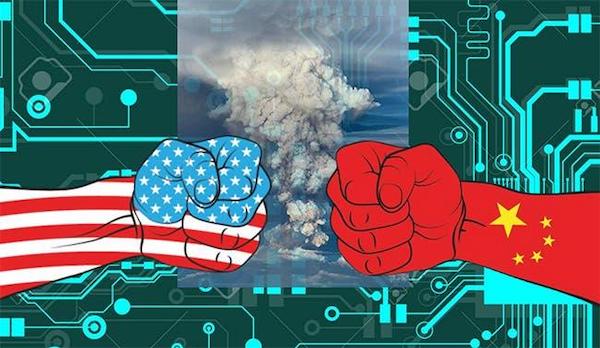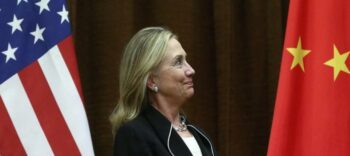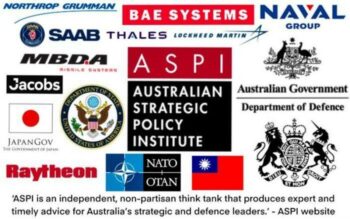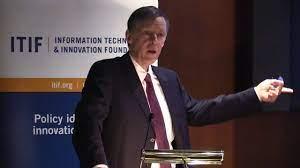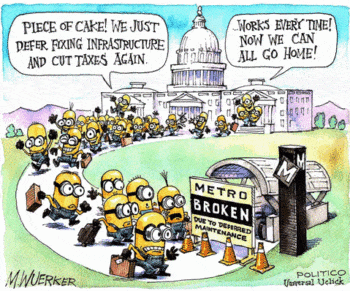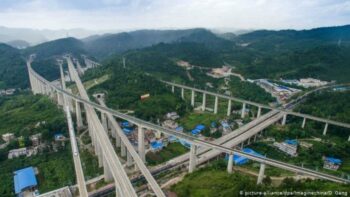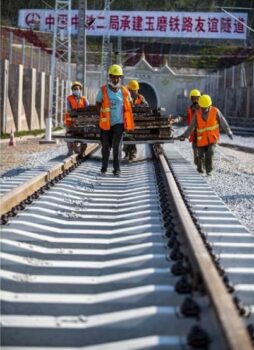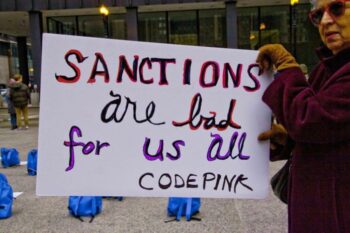~~ posted for dmorista with introduction by dmorista ~~
Introduction by dmorista:
The crux of the arguments that Haiphong addresses in this article is that China used existing technology (manufactured under standard licensing agreements I hasten to add although Haiphong did not address that issue) but subsidizes it with their massive economic surpluses; and thereby they undercut Western (including Japanese and S. Korean) high speed rail companies. And to be honest, those are arguments that have some validity. Of course, the Capitalist/Western argument does not mention that, during the 2007-2008 Financial Crisis and Economic Collapse, that China began building its high-speed rail system along with other Keynesian investments; as the way to get out of the financial crisis and the resultant downturn in Western demand for China's industrial capital and consumer products. So in essence; while the U.S. and Western European Central Banks and Governments gave trillions of dollars to their failing financial institutions, to save their pals and donors, the Chinese spent their trillions of dollars on new infrastructure. China was widely criticized by U.S. / Western political and socioeconomic analysts for building “roads to nowhere” and “entire cities that sat empty”, and so on and so on. But in fact China, that did not have one kilometer of inter-city high speed rail line in 2007, started building the world's largest high-speed train system. They now have over 22,000 Kilometers of high-speed rail track.
It is ironic that the highly critical article in Railway Age, “Report: Chinese Policies Damaging HSR, Globally”, April 26, 2021, William C. Vantuono, Editor-in-Chief (for which there is a link in the first sentence of Haiphong's article) and the much longer actual report Heading Off Track: The Impact of China’s Mercantilist Policies on Global High-Speed Rail Innovation, (it was written by the Information Technology Innovation Foundation (ITIF) there is a link to the report at the bottom of the Railway Age article), are both featured in American publications.
The irony is made all the more blatant as the U.S. does not have even one kilometer of true high speed rail track, the closest approximation being the Accela train in the NorthEast Corridor that runs from Washington D.C. to Boston. The Accela is not really a serious high-speed train line, it is not electrified, shares the ancient rail lines with slow-moving freight trains, actually had some collisions where doubled curving tracks were too close together and northbound and southbound Acella trains actually side-swiped each other, has a few spots where the trains can go 90 mph, but the route average speed is down around 50 mph. The only other U.S. high speed train is the line under construction in California that is bogged down in routing disputes and eminent domain battles. The U.S. does operate a massive freight train system (mostly to move Chinese goods from Pacific Coast Ports to the rest of the U.S.
Haiphong argues that the real dispute is that the Chinese are publicly funding their train system and the U.S / West want them to follow the discredited Neoliberal Privatization model. Also the Chinese, like other societies before them, built a new national system, in this case high-speed rail, by deciding on adopting a standard technology and widely implementing it. Both the Japanese and French before them built their high speed train systems while at the same time developing and perfecting the technology. By the time the Chinese decided to build a high-speed train system there was perfectly adequate technology available. The Chinese did decide to gradually replace the material bought from foreign suppliers with domestically produced equipment. The argument made in the ITIF report is that China should just buy high-speed rail equipment from the lowest priced foreign sources; China that suffered when the West was more developed and industrialized than they were has no intention of following the WTO Neoliberal model.
=============
Article:
Anew report published in Railway Age magazine and written by the Information Technology Innovation Foundation (ITIF) has sounded the alarm about China’s growing high-speed rail sector. The report comes amid escalations in the U.S.’s New Cold War against China, of which technology is a key component.
China is by far the world leader in high-speed rail investment and development, sporting more than 35,000 kilometers (21,700 miles) of high-speed rail, or 68 percent of the world’s total. The ITIF itself admits to China’s rapid success in this sector since its first high-speed rail line was completed in 2008:Since then, China has opened thousands of kilometers of high-speed lines with speeds ranging from 200 to 350 kph. To do this, China spent hundreds of billions of dollars on the world’s most expensive public-works project since President Eisenhower’s Interstate Highway System of the 1950s.
The United States might learn from China’s success in investing in high-speed rail and try and emulate it; however, according to the ITIF, China’s high-speed rail policies damage “innovation” by privileging domestic market development and state-owned enterprises over the interests of private, foreign firms primarily residing in the West. China is accused of employing a form of “mercantilism” to manipulate the global market at the expense of the superior capabilities of Western, Japanese, and American investors.
The term “mercantilism” has been used by big business interests in the U.S. and West to portray China’s policy of indigenous development as a high crime against the free market. In fact, the ITIF has been sounding the alarm about China’s prioritization of its own tech sector since 2013.
It lamented that China was no longer keeping its promise “to be a low-cost production platform for foreign multinational corporations (MNCs).” As if the Chinese government’s function was to serve the latter’s needs and not that of its own people.
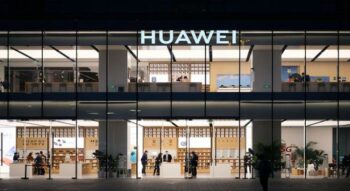
The telecommunications giant was a target of the Trump administration’s tech war on China. [Source: wired.com]
Biden has proclaimed that the U.S. is in a battle against China to “win the 21st century” and has expanded the list of Chinese telecommunications and supercomputing companies on the U.S.’s blacklist. In a recent speech to the UK-funded Chatham House, neo-con hawk and twice-failed presidential candidate Hillary Clinton passionately claimed that the U.S. is at “the mercy of China” and demanded that the U.S. “take back the means of production.”
The U.S. war on China’s tech sector therefore shares widespread bipartisan support. As this analysis will demonstrate, far from calling for more public investment in the needs of an increasingly destitute U.S. workforce, the ITIF’s new warnings about China’s high-speed rail sector reveal how powerful economic interests are pushing for a new Cold War with China alongside the perpetuation of neoliberal economic policies that prioritize the interests of multi-national corporations.Who Is behind ITIF?
Richard Haass, the President of the Council on Foreign Relations noted in a 2002 speech at the State Department that think tanks serve as an important bridge between policy and action, and have been shaping U.S. foreign policy for over 100 years.What Haass leaves out is that the majority are funded by corporate and military interests to help condition the public and skew public policy in a direction that favors capitalist elites and not the public at large.
The Information Technology Innovation Foundation (ITIF) claims to be an independent public policy think-tank based in Washington, D.C. However, a closer look into its background demonstrates that ITIF is a pillar of free-market fundamentalism and the military and corporate domination in world affairs required to maintain the U.S.-led neoliberal order.
Currently, it is one of several players driving a false and demonized view of China that may very well provoke a new world war.The ITIF receives the vast majority of its funding from U.S. corporations in every sector of the economy. This includes the two largest employers in the United States, Walmart and Amazon.
More notable in the realm of technology and militarism is the host of donors from the defense and U.S. big-tech industries. Northrop Grumman, Boeing, and leading Silicon Valley corporations as well as the Charles Koch Institute join an alliance of U.S. monopolies and industry associations backing the ITIF.
The same corporations backing the ITIF have led the charge in pressuring Washington to take a hostile approach to China’s tech sector, whose success threatens them. Amazon and Northrop Grumman, the major arms manufacturer also are top sponsors of the Australian Strategic Policy Institute (ASPI).
ASPI has produced several dubious reports on China’s supposed repression of Uyghurs in Xinjiang. Some of these reports attack journalists who have challenged the official narrative, notably at the Grayzone project. ASPI publications have generally been used by Washington to enhance sanctions against China over “human rights” claims.ITIF founder and President Robert D. Atkinson is a champion of global neoliberalism who is regarded highly in elite circles as a tech policy guru.
Prior to founding the ITIF, Atkinson served as Vice President of the Progressive Policy Institute, a think-tank of the Bill Clinton-led Democratic Leadership Council (DLC) that sports initiatives such as the Neoliberal Project. Atkinson has served as an adviser for every U.S. administration from Bill Clinton to Donald Trump.
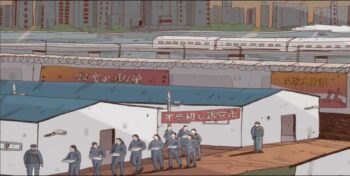
Cover of ASPI report on the persecution of Uyghurs in China’s Xinjiang province. Military-funded think-tanks are playing up China’s alleged human rights abuses in Xinjiang to mobilize public opinion against China. [Source: saveuighur.org]
In a testament to his commitment to Clinton-era neoliberalism, Atkinson argued in a 2011 article that progressives should drop social welfare policies and instead “support corporations” in their fight against “foreign mercantilism.”
More recently he has been warning about the China “threat” which he uses as a pretext for promoting the implementation of his conservative economic ideals.
China’s High-Speed Rail Ascendency a Nightmare for Neoliberalism
Given Atkinson’s history, it should come as little surprise that the ITIF’s report Heading Off Track: The Impact of China’s Mercantilist Policies on Global High-Speed Rail Innovation reads like a cartoonish screed against public investment.
Authored by Nigel Cory, the report provides an inside look into the nightmare that China’s high-speed rail presents to the global order of neoliberalism.
Mercantilism is a derogatory word devised by free-market fundamentalists to describe the prioritization of domestic market development. According to the report, China’s largest rail manufacturer, the CRRC, is state owned and “has the largest share of the global high-speed rail market due to its dominance of the Chinese market.”What is particularly troublesome to the ITIF is that China’s early reliance on foreign technology to develop its high-speed rail sector has been gradually replaced with domestic alternatives.
The report blames China’s dominance over its own market for the failures of European, Japanese, and U.S. rail manufacturers to keep up with high-speed rail production. European firms such as Alstom or Japanese firms such as Hitachi are described as “innovative” more than a dozen times yet have seen their market share in the industry decrease as much as fifty percent since 2007. The United States does not have a single high-speed rail firm capable of developing high-speed rail and has thus fallen the furthest behind.
That more “innovative” firms in the U.S. orbit have fallen behind China is an obvious contradiction. To explain away failure, the ITIF outlines measures China has taken to unfairly keep foreign corporations out of the Chinese market. Many of these claims are contradicted in the report itself.“Forced technology transfer” is a particular sore point for the ITIF and forms the basis of claims of “stolen” intellectual property constantly made by the United States and its allies. China is accused of forcing foreign firms to share technology on an unequal basis. Yet so-called “forced” technology transfers are not forced at all. Rather, as the report explains:
Describing this scenario as “forced” obscures the actual problem: that China does not allow its high-speed rail market to be controlled and dominated by foreign, mainly U.S. and European, firms. Rather, China allows foreign firms to invest in rail development only if Chinese firms maintain majority ownership and are allowed access to information which allows them to develop the technology domestically.China’s ongoing requirement for 100 percent Chinese-owned technology in many procurement contracts, combined with foreign firms having to engage with majority-Chinese owned JVs [joint ventures] in order to submit a bid, amounts to a de facto mandate to transfer technology to local partners. Foreign firms continue to capitulate because they have no choice—they either give up their technology or lose out to other competitors in the growing Chinese market.
While the ITIF claims foreign rail firms had “no choice” in doing business with China, it also admits that these same firms entered into such agreements willingly in part because China was not expected to catch up to its foreign peers so fast.
Another particularly sore point for the ITIF is China’s bidding process. Foreign rail firms must partner with a Chinese firm just to hold a license to operate and compete for procurement contracts in the Chinese market. Foreign firms are allowed no more than forty-nine percent of the shares in any joint venture.
As the report laments, only a limited number of entirely state-owned companies are allowed to contract for projects in China, thereby ensuring little flexibility in the way revenue is spread between foreign and Chinese partners.A huge fear among the industrial and financial magnates that fund ITIF is that China’s model for infrastructure development in the high-speed rail sector will spread globally. The report expresses anguish over the Belt and Road Initiative directly, the massive government-led global infrastructure plan that China hopes will create sustained trade relations between itself and nations along the old Silk Road.
China has appointed CRRC, its foremost state-owned rail company, to develop rail projects abroad such as the Sino-Laos railway set to debut before 2021’s end.
The global expansion of China’s high-speed rail sector is particularly problematic because of its disregard for profit. High-speed rail is a costly endeavor which requires massive investments in research and development and components that can range from $17 to $21 million per kilometer of rail. The report quotes an unnamed executive who makes clear that foreign firms lack “the full weight and money of the state behind them in the way the Chinese rail companies do.”In sum, China is accused by the ITIF of unfairly gobbling up market share from foreign firms by “stealing” intellectual property and “forcing” technology transfer. No proof is provided by the ITIF that verifies either claim. More importantly, the report simultaneously admits that foreign (read U.S. and EU) firms are unable to compete with China in large part because high-speed rail requires massive public investment rather than the prioritization of private profit.
Sanctions: Economic Weapon of the New Cold War
To punish China’s public investment in high-speed rail, the ITIF recommends first and foremost that foreign competitors, principally the United States and Europe, pursue sanctions against China. Thirty-nine countries around the world currently suffer from starvation sanctions imposed by the U.S. or EU. Sanctions are an act of war that cuts off a country’s access to the international market and, in the cases of Iran and Venezuela, prevent the import of crucial supplies necessary to sustain human life.
The ITIF specifically calls on the EU and the United States to work together to prevent Chinese acquisition of rail firms and contracts abroad. This would amount to a de facto blockade of China’s access to European and U.S. technology required for the development of high-speed rail and is not dissimilar to existing U.S. sanctions on the semiconductor industry meant to slow China’s progress in the realm of “smart” technology.The ITIF also suggests that U.S. and European governments adopt higher prices for public procurement contracts for foreign investment in rail projects and more stringent screening processes to essentially prevent China’s high-speed rail sector from expanding into the industrialized world.
Perhaps most damning is the ITIF’s inclusion of the demand that the World Bank withdraw financial support to China. Historically, the World Bank has operated alongside the IMF as an enforcer of global privatization, particularly in the Global South.
Structural adjustment programs implemented in countries across Asia, Latin America, and Africa have reinforced neocolonialism and massively increased extreme poverty around the world to the benefit of financial elites in the U.S. and Europe. That the ITIF would demand the withdrawal of World Bank funds from Chinese-backed high-speed rail projects demonstrates the lengths the U.S. and its allies will go to contain the rise of China.
Sanctions are indisputably the economic weapon of choice in the U.S.-led New Cold War on China. While many who politically identify as “left” in the U.S. and West see China as a “capitalist” country, it is clear that the U.S. and its allies employ targeted sanctions not on capitalist firms but on socialist development in China and elsewhere.
The ITIF specifically targets state-owned enterprises in China for sanctions in the same manner that the U.S. currently enforces targeted sanctions on state-owned enterprises in Belarus and Myanmar.
Regardless of whether the justification is “human rights” or “competition,” the effect of sanctions is to starve countries of their capacity to meet the needs of their people in the hopes that they will either “play ball” with U.S. and EU hegemony or see their political systems replaced with more compliant regimes.
China does not “play ball” with U.S. hegemony. China maintains public ownership over key sectors of the economy such as high-speed rail and disregards U.S. and European sanctions placed on poor nations across the Global South. This is evidenced by China’s massive bilateral relationships with Iran and Russia. China is also Europe’s, Latin America’s, and Africa’s largest trading partner.
Furthermore, high-speed rail marks only one area where China has surpassed the U.S. and European powers technologically. China leads the world in artificial intelligence, regenerative medicine, and a host of other sectors that once were dominated by private U.S. and European firms.

Visitors check their phones behind the screen advertising facial recognition software during the Global Mobile Internet Conference (GMIC) at the National Convention in Beijing, China, April 27, 2018. [Source: pri.org]
This article appeared to reflect a tacit admission of the failure of the economic model Atkinson and his ilk have tried to impose on the rest of the world, and reaffirmation of China’s policies.
Free-Market Fundamentalism Spells Doom for Humanity
The ITIF not only calls for sanctions but also for direct public investment to spur “innovation” and make the U.S. and its allies competitive again. The U.S. Senate Commerce Committee has followed these recommendations by approving $110 billion in basic research in the tech sector.
Still, there is an obvious contradiction in the demonization of China’s state-owned economy and the U.S.’s decision to increase government spending in tech research to counter China. This contradiction is unlikely to be resolved given that the New Cold War is predicated upon the religion of free-market fundamentalism—an ideology which is foundational to U.S.-led neoliberal capitalism.As economist Michael Hudson remarks, the New Cold War on China is essentially a clash of two systems:
Today’s Cold War 2.0 aims to deter China and potentially other counties from socializing their financial systems, land and natural resources, and keeping infrastructure utilities public to prevent their being monopolized in private hands to siphon off economic rents at the expense of productive investment in economic growth.
Free-market fundamentalism spells doom for humanity. It is that which Secretary of State Tony Blinken chastised China when he said they were not following the “rules-based international order.”
Free-market fundamentalism is behind the massive bailouts and stock buybacks Biden supported under the Obama administration and the massively bloated U.S. military budgets, which pad the profits of private weapons manufacturers.
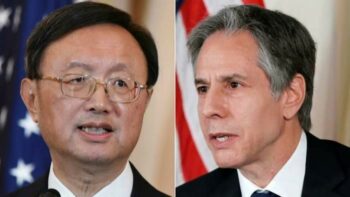
Yang Jiechi, the top Chinese foreign policy official, left, and Antony Blinken, U.S. Secretary of State, in Anchorage, Alaska, in March. Blinken angered the Chinese by lecturing them on human rights even before the meeting began. [Source: ft.com]
China’s high-speed rail sector is now under fire from the U.S.-led neoliberal order precisely because the titans of big tech and finance cannot imagine development that does not place the massive profits of capitalists such as Jeff Bezos and Bill Gates in command of international politics.
Think-tanks such as the ITIF serve as mouthpieces for their Wall Street and Silicon Valley funders. It is quite clear from ITIF’s report on high-speed rail that, beneath the bellicose rhetoric and policies of the U.S.-led New Cold War on China, is a very real attempt to stymie the progress of alternative economic arrangements to neoliberalism on the world stage.
